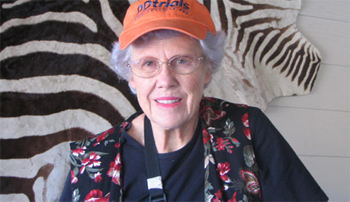Parkinson’s disease literally wiped the smile from Nellie Faye Hagberg’s face.
Her smile had greeted thousands of East Africans where she and husband, Ray, were missionaries for 36 years. It gave hope and courage to her three children, all born and raised in Africa.
About 20 years ago, the disease began to mask her gregarious nature.
 |
Nellie Hagberg |
Now, her smile has returned thanks to an experimental drug taken since April through a clinical trial at UNMC.
“I feel like my old self again,” said Hagberg, 74. “I have more energy, more life. This medicine has allowed me to regain my sense of self.”
Parkinson’s disease, a degenerative disorder that kills dopamine-producing brain cells, causes tremors, stiffness, slowness and impaired balance.
About one million Americans have Parkinson’s and there is no cure — though medications provide some relief.
|
The oral tablet form of levodopa-carbidopa is the primary drug prescribed in the United States, but may not be absorbed efficiently, said Carolyn Peterson, nurse coordinator of the trial.
The gel form, marketed in Europe but not in the U.S., is pumped directly into the small intestine where it is absorbed into the bloodstream.
|
Every 40 days, she travels four hours from her Spencer, Neb., home to get a supply of medicine. This will continue for the next four years or until the drug gains approval in the U.S.
She looks forward to continuing in trials for this medication.
“We can only make advances in medical care when people are willing to take a risk,” Hagberg said. “Somebody has to do it, why not me?”
Great story and great lady. Her caring and giving attitude gives me hope which is sometimes hard to find in today's world.
What a brave woman! I'm in awe of her strength.